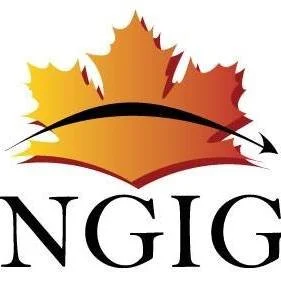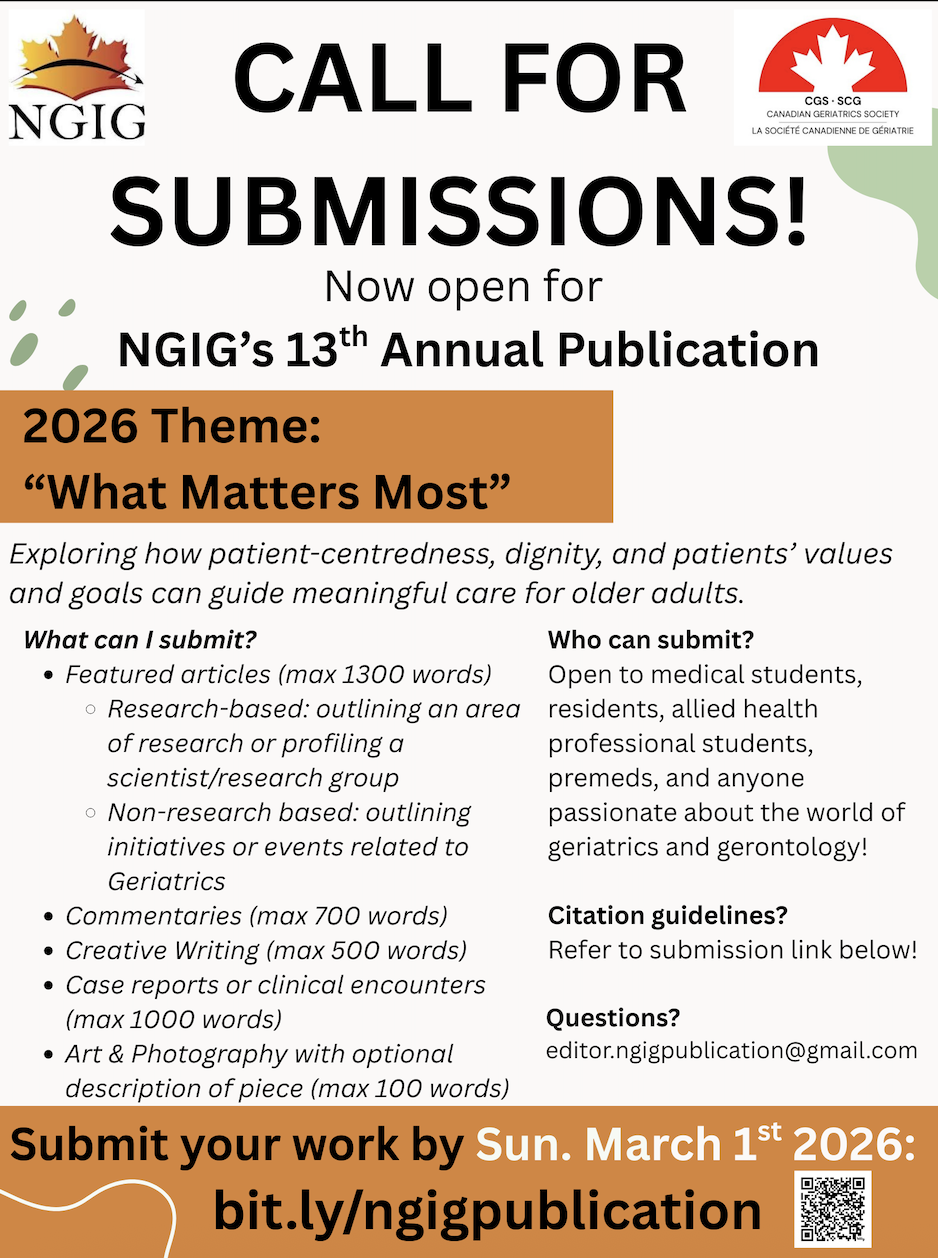educationWelcome to the CGS Student Site
A platform for medical students interested in the care of older adults. Here, you’ll find resources, student news, and spotlights on student-led initiatives.
The National Geriatrics Interest Group (NGIG) is a national, student-led organization dedicated to championing advocacy and education in the care of older adults. We are involved in several initiatives, including creating an annual publication and coordinating student awards. We also support local Geriatrics Interest Groups across the majority of medical schools in Canada. If you are interested in learning more about the NGIG, please contact us at ngig.cgs@gmail.com
Connect with Us!
CALL FOR SUBMISSIONS! NGIG’s 13th Annual Publication
Submissions are NOW OPEN for the 13th edition of the National Geriatrics Interest Group (NGIG) annual publication! This year’s theme is “What Matters Most”, and will explore how patient-centredness, dignity, and patients’ values and goals can guide meaningful care for older adults.
Submit your work at bit.ly/ngigpublication by Sunday, March 1st at 11:59PM PST! Click the link for mor
Who can submit?
Open to medical students, residents, allied health professional students, premeds, and anyone passionate about the world of geriatrics and gerontology!
Questions?
Please email editor.ngigpublication@gmail.com.
The 11th Annual NGIG Publication
NEWEST ISSUE!
The 12th Annual NGIG Publication
The 10th Annual NGIG Publication
Download More NGIG Publications
-
2021 Transformation: Adapting to the Changing Needs of Seniors During a Pandemic
CLICK HERE FOR PUBLICATION2020 The Fight Against Frailty
CLICK HERE FOR PUBLICATION2019 Aging Wisely: Strengthening Dignity and Resilience Through Narrative and Research
CLICK HERE FOR PUBLICATION2018 Healthy Aging: Innovations and Strategies in Geriatric Medicine and Research
CLICK HERE FOR PUBLICATION2017 Revolutions in Geriatrics: Perspectives on the Past, Present, and Future
CLICK HERE FOR PUBLICATION2016 Expanding Horizons: Changing Perspectives and Innovations in Geriatric Care
CLICK HERE FOR PUBLICATION2015 Spotlight: Geriatric Education
CLICK HERE FOR PUBLICATION2014 NGIG Publication: Volume 2, Issue 1
CLICK HERE FOR PUBLICATION2013 NGIG Publication: Volume 1, Issue 1
CLICK HERE FOR PUBLICATION
Featured Student Researchers 2024
Geriatrics research is vital to continue improving the care of Canada's aging population. Check out the featured NGIG Student Researchers below that NGIG's VP Research had the opportunity to interview. If you would like your research featured or have something interesting to share, please reach out to Rachael Donnelly at ngigvpresearch@gmail.com.
Highlighted Research in Geriatric Medicine
Mobile Technology for Falls Prevention in Older Adults
Katherine L. Hsieh, PhD, Lingjun Chen, MS,2 and Jacob J. Sosnoff, PhD J Gerontol A Biol Sci Med Sci, 2023 https://doi.org/10.1093/gerona/glac116
To address the consequences of falls in older adults and the need for the implementation of evidence-based fall prevention programs, The World Congress on Falls and Postural Instability has suggested implementing a P4 model (personalization, prediction, prevention, and participation) to optimize fall prevention strategies. In this review, the authors explored how this P4 model has been integrated into mobile device applications for fall risk screening and prevention, along with the validity and usability of these applications.
The results suggest that many applications focus primarily on the measurement of fall risk factors for screening, typically using smartphone IMUs (accelerometers, gyroscopes, magnetometers) to objectively measure static and dynamic balance. However, It was found that only a few mobile device applications integrated prevention strategies, and none included the full P4 model (personalization, prediction, prevention, participation). The authors highlighted the need for more comprehensive applications that assess multiple risk factors and integrate all components of this model.
Read more here: click here
RESOURCESPhysician Research Database for Medical Students
Are you a medical student interested in geriatrics research? NGIG created a database that includes a list of physicians actively conducting research in geriatrics who are open to being contacted by students for potential research opportunities.
This is a fantastic way to network, explore geriatrics research, build valuable skills, and enhance your CV! Whether you’re looking to gain experience in clinical or academic research, this resource can help you find projects that align with your interests.
If a physician's work interests you, don’t hesitate to reach out to them directly!
Check out the database: Click here
Care of Elderly Mentors Contact and Q&A
Interested in the Care of the Elderly (COE) pathway? We've compiled a list of COE physicians who have generously agreed to serve as mentors for medical students. Feel free to reach out to them with any questions about residency or career opportunities in this field!
Check out the database: Click here
We’ve compiled answers to some of the most frequently asked questions from medical students about the COE pathway, answered directly by a Care of the Elderly physician. Check out the Q&A below to learn more about this rewarding field!
Check out the COE Q&A: Click here
A Geriatrics Pocketbook Made by Medical Students, for Medical Students
NGIG has developed a pocketbook resource for medical students, offering concise and clinically relevent information on key topics in geriatrics.
Available for download: Click here

Renewal Reminder
Renew your CGS membership if you haven't already by going to your member profile! Thank you for your continuous support and for being a member of the Canadian Geriatrics Society. We are looking forward to another fantastic year!














